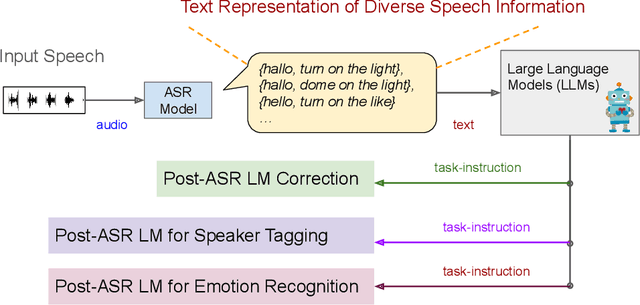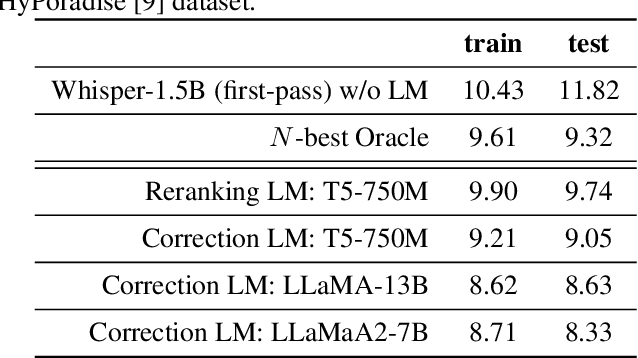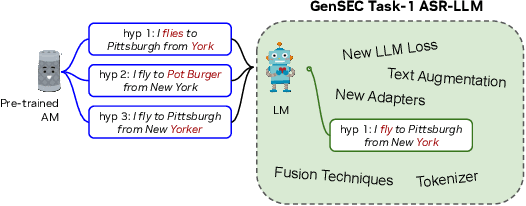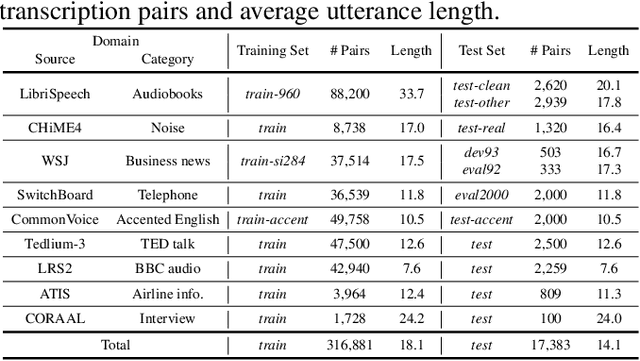Yuchen Hu
Improving Code-Switching Speech Recognition with TTS Data Augmentation
Jan 02, 2026Abstract:Automatic speech recognition (ASR) for conversational code-switching speech remains challenging due to the scarcity of realistic, high-quality labeled speech data. This paper explores multilingual text-to-speech (TTS) models as an effective data augmentation technique to address this shortage. Specifically, we fine-tune the multilingual CosyVoice2 TTS model on the SEAME dataset to generate synthetic conversational Chinese-English code-switching speech, significantly increasing the quantity and speaker diversity of available training data. Our experiments demonstrate that augmenting real speech with synthetic speech reduces the mixed error rate (MER) from 12.1 percent to 10.1 percent on DevMan and from 17.8 percent to 16.0 percent on DevSGE, indicating consistent performance gains. These results confirm that multilingual TTS is an effective and practical tool for enhancing ASR robustness in low-resource conversational code-switching scenarios.
Attributing Response to Context: A Jensen-Shannon Divergence Driven Mechanistic Study of Context Attribution in Retrieval-Augmented Generation
May 22, 2025Abstract:Retrieval-Augmented Generation (RAG) leverages large language models (LLMs) combined with external contexts to enhance the accuracy and reliability of generated responses. However, reliably attributing generated content to specific context segments, context attribution, remains challenging due to the computationally intensive nature of current methods, which often require extensive fine-tuning or human annotation. In this work, we introduce a novel Jensen-Shannon Divergence driven method to Attribute Response to Context (ARC-JSD), enabling efficient and accurate identification of essential context sentences without additional fine-tuning or surrogate modelling. Evaluations on a wide range of RAG benchmarks, such as TyDi QA, Hotpot QA, and Musique, using instruction-tuned LLMs in different scales demonstrate superior accuracy and significant computational efficiency improvements compared to the previous surrogate-based method. Furthermore, our mechanistic analysis reveals specific attention heads and multilayer perceptron (MLP) layers responsible for context attribution, providing valuable insights into the internal workings of RAG models.
AnalyticKWS: Towards Exemplar-Free Analytic Class Incremental Learning for Small-footprint Keyword Spotting
May 17, 2025Abstract:Keyword spotting (KWS) offers a vital mechanism to identify spoken commands in voice-enabled systems, where user demands often shift, requiring models to learn new keywords continually over time. However, a major problem is catastrophic forgetting, where models lose their ability to recognize earlier keywords. Although several continual learning methods have proven their usefulness for reducing forgetting, most existing approaches depend on storing and revisiting old data to combat catastrophic forgetting. Though effective, these methods face two practical challenges: 1) privacy risks from keeping user data and 2) large memory and time consumption that limit deployment on small devices. To address these issues, we propose an exemplar-free Analytic Continual Learning (AnalyticKWS) method that updates model parameters without revisiting earlier data. Inspired by efficient learning principles, AnalyticKWS computes a closed-form analytical solution for model updates and requires only a single epoch of adaptation for incoming keywords. AnalyticKWS demands fewer computational resources by avoiding gradient-based updates and does not store old data. By eliminating the need for back-propagation during incremental learning, the model remains lightweight and efficient. As a result, AnalyticKWS meets the challenges mentioned earlier and suits resource-limited settings well. Extensive experiments on various datasets and settings show that AnalyticKWS consistently outperforms existing continual learning methods.
VeriDebug: A Unified LLM for Verilog Debugging via Contrastive Embedding and Guided Correction
Apr 27, 2025Abstract:Large Language Models (LLMs) have demonstrated remarkable potential in debugging for various programming languages. However, the application of LLMs to Verilog debugging remains insufficiently explored. Here, we present VeriDebug, an approach that integrates contrastive representation and guided correction capabilities for automated Verilog debugging. Unlike existing methods, VeriDebug employs an embedding-based technique to accurately retrieve internal information, followed by bug-fixing. VeriDebug unifies Verilog bug detection and correction through a shared parameter space. By simultaneously learning bug patterns and fixes, it streamlines debugging via contrastive embedding and guided correction. Empirical results show the efficacy of VeriDebug in enhancing Verilog debugging. Our VeriDebugLoc, Type model achieves 64.7 accuracy in bug fixing (Acc1), a significant improvement from the existing open-source SOTAs 11.3. This performance not only outperforms open-source alternatives but also exceeds larger closed-source models like GPT-3.5-turbo (36.6), offering a more accurate alternative to conventional debugging methods.
Insights from Verification: Training a Verilog Generation LLM with Reinforcement Learning with Testbench Feedback
Apr 22, 2025Abstract:Large language models (LLMs) have shown strong performance in Verilog generation from natural language description. However, ensuring the functional correctness of the generated code remains a significant challenge. This paper introduces a method that integrates verification insights from testbench into the training of Verilog generation LLMs, aligning the training with the fundamental goal of hardware design: functional correctness. The main obstacle in using LLMs for Verilog code generation is the lack of sufficient functional verification data, particularly testbenches paired with design specifications and code. To address this problem, we introduce an automatic testbench generation pipeline that decomposes the process and uses feedback from the Verilog compiler simulator (VCS) to reduce hallucination and ensure correctness. We then use the testbench to evaluate the generated codes and collect them for further training, where verification insights are introduced. Our method applies reinforcement learning (RL), specifically direct preference optimization (DPO), to align Verilog code generation with functional correctness by training preference pairs based on testbench outcomes. In evaluations on VerilogEval-Machine, VerilogEval-Human, RTLLM v1.1, RTLLM v2, and VerilogEval v2, our approach consistently outperforms state-of-the-art baselines in generating functionally correct Verilog code. We open source all training code, data, and models at https://anonymous.4open.science/r/VeriPrefer-E88B.
GenSE: Generative Speech Enhancement via Language Models using Hierarchical Modeling
Feb 05, 2025Abstract:Semantic information refers to the meaning conveyed through words, phrases, and contextual relationships within a given linguistic structure. Humans can leverage semantic information, such as familiar linguistic patterns and contextual cues, to reconstruct incomplete or masked speech signals in noisy environments. However, existing speech enhancement (SE) approaches often overlook the rich semantic information embedded in speech, which is crucial for improving intelligibility, speaker consistency, and overall quality of enhanced speech signals. To enrich the SE model with semantic information, we employ language models as an efficient semantic learner and propose a comprehensive framework tailored for language model-based speech enhancement, called \textit{GenSE}. Specifically, we approach SE as a conditional language modeling task rather than a continuous signal regression problem defined in existing works. This is achieved by tokenizing speech signals into semantic tokens using a pre-trained self-supervised model and into acoustic tokens using a custom-designed single-quantizer neural codec model. To improve the stability of language model predictions, we propose a hierarchical modeling method that decouples the generation of clean semantic tokens and clean acoustic tokens into two distinct stages. Moreover, we introduce a token chain prompting mechanism during the acoustic token generation stage to ensure timbre consistency throughout the speech enhancement process. Experimental results on benchmark datasets demonstrate that our proposed approach outperforms state-of-the-art SE systems in terms of speech quality and generalization capability.
A Bias-Correction Decentralized Stochastic Gradient Algorithm with Momentum Acceleration
Jan 31, 2025



Abstract:Distributed stochastic optimization algorithms can handle large-scale data simultaneously and accelerate model training. However, the sparsity of distributed networks and the heterogeneity of data limit these advantages. This paper proposes a momentum-accelerated distributed stochastic gradient algorithm, referred to as Exact-Diffusion with Momentum (EDM), which can correct the bias caused by data heterogeneity and introduces the momentum method commonly used in deep learning to accelerate the convergence of the algorithm. We theoretically demonstrate that this algorithm converges to the neighborhood of the optimum sub-linearly irrelevant to data heterogeneity when applied to non-convex objective functions and linearly under the Polyak-{\L}ojasiewicz condition (a weaker assumption than $\mu$-strongly convexity). Finally, we evaluate the performance of the proposed algorithm by simulation, comparing it with a range of existing decentralized optimization algorithms to demonstrate its effectiveness in addressing data heterogeneity and network sparsity.
Audio Large Language Models Can Be Descriptive Speech Quality Evaluators
Jan 27, 2025Abstract:An ideal multimodal agent should be aware of the quality of its input modalities. Recent advances have enabled large language models (LLMs) to incorporate auditory systems for handling various speech-related tasks. However, most audio LLMs remain unaware of the quality of the speech they process. This limitation arises because speech quality evaluation is typically excluded from multi-task training due to the lack of suitable datasets. To address this, we introduce the first natural language-based speech evaluation corpus, generated from authentic human ratings. In addition to the overall Mean Opinion Score (MOS), this corpus offers detailed analysis across multiple dimensions and identifies causes of quality degradation. It also enables descriptive comparisons between two speech samples (A/B tests) with human-like judgment. Leveraging this corpus, we propose an alignment approach with LLM distillation (ALLD) to guide the audio LLM in extracting relevant information from raw speech and generating meaningful responses. Experimental results demonstrate that ALLD outperforms the previous state-of-the-art regression model in MOS prediction, with a mean square error of 0.17 and an A/B test accuracy of 98.6%. Additionally, the generated responses achieve BLEU scores of 25.8 and 30.2 on two tasks, surpassing the capabilities of task-specific models. This work advances the comprehensive perception of speech signals by audio LLMs, contributing to the development of real-world auditory and sensory intelligent agents.
An Investigation on the Potential of KAN in Speech Enhancement
Dec 23, 2024



Abstract:High-fidelity speech enhancement often requires sophisticated modeling to capture intricate, multiscale patterns. Standard activation functions, while introducing nonlinearity, lack the flexibility to fully address this complexity. Kolmogorov-Arnold Networks (KAN), an emerging methodology that employs learnable activation functions on graph edges, present a promising alternative. This work investigates two novel KAN variants based on rational and radial basis functions for speech enhancement. We integrate the rational variant into the 1D CNN blocks of Demucs and the GRU-Transformer blocks of MP-SENet, while the radial variant is adapted to the 2D CNN-based decoders of MP-SENet. Experiments on the VoiceBank-DEMAND dataset show that replacing standard activations with KAN-based activations improves speech quality across both the time-domain and time-frequency domain methods with minimal impact on model size and FLOP, underscoring KAN's potential to improve speech enhancement models.
Large Language Model Based Generative Error Correction: A Challenge and Baselines for Speech Recognition, Speaker Tagging, and Emotion Recognition
Sep 17, 2024



Abstract:Given recent advances in generative AI technology, a key question is how large language models (LLMs) can enhance acoustic modeling tasks using text decoding results from a frozen, pretrained automatic speech recognition (ASR) model. To explore new capabilities in language modeling for speech processing, we introduce the generative speech transcription error correction (GenSEC) challenge. This challenge comprises three post-ASR language modeling tasks: (i) post-ASR transcription correction, (ii) speaker tagging, and (iii) emotion recognition. These tasks aim to emulate future LLM-based agents handling voice-based interfaces while remaining accessible to a broad audience by utilizing open pretrained language models or agent-based APIs. We also discuss insights from baseline evaluations, as well as lessons learned for designing future evaluations.
 Add to Chrome
Add to Chrome Add to Firefox
Add to Firefox Add to Edge
Add to Edge